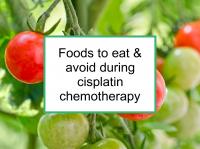Cisplatin is a platinum-based chemotherapy drug that is used in combination with other drugs for advanced breast cancer and for triple negative disease (ER-/PR-/HER2-). Platinum-based drugs ("platins") such as cisplatin, carboplatin and oxaliplatin cause crosslinking of DNA strands, thereby interfering with DNA repair and synthesis, and inducing programmed cell death.
Foods that enhance cisplatin treatment or safely reduce side effects
The following foods are good sources of compounds that have been shown to enhance the anti-cancer effects of cisplatin and/or safely reduce its side effects:
- Apples
- Apricots, fresh
- Artichokes
- Arugula
- Basil
- Bell peppers
- Black beans
- Black cumin
- Black pepper
- Blackberries
- Blueberries & bilberries
- Boysenberries
- Brazil nuts
- Broccoli & broccoli sprouts
- Brussels sprouts
- Buckwheat
- Cabbage
- Cantaloupe
- Carrots
- Cauliflower
- Celery & celery seed
- Cherries, sweet or tart
- Chili powder
Please read the applicable food webpages when making your own food lists since these pages contain important advice, food rankings (e.g., highly recommended, recommended in moderation), consumption limits, and other pertinent information.
See our webpages concerning cisplatin and fruit, vegetables, herbs & spices or nuts, seeds, beans & grains for more studies concerning the foods above than can be shown at the end of this webpage.
Aspirin is the best choice of over-the-counter pain medications (assuming the gastrointestinal and other side effects can be tolerated) since aspirin has been shown to lower the concentration of cisplatin required to exert its cytotoxic action on tumor cells. On the other hand, the prescription painkiller Celebrex has been shown to reduce the effectiveness of cisplatin. The anti-diabetic drug metformin has also been shown to increase the cytotoxic treatment effects of cisplatin.
Foods to limit or avoid during cisplatin treatment
The following foods or important components been reported to interfere with the effectiveness of cisplatin:
- Sugar and other high glycemic index foods
- Shellfish
See Limit or avoid during cisplatin chemotherapy for breast cancer - foods for related studies.
Supplements for patients being treated with cisplatin
There is no supplement or combination of supplements that has been proven to reliably reduce the risk of breast cancer recurrence in women. Attempting to take advantage of the apparent treatment effects of micronutrients and other dietary components by using supplements carries the risk of adverse and paradoxical effects, including promoting breast cancer growth and metastasis.
When a beneficial micronutrient is administered at low doses by consuming food, it is likely to have subtle chemopreventive effects, whereas when the same micronutrient is administered at high doses, it is more likely to have pharmacological effects, with mostly unknown results. Therefore, it is best to obtain beneficial compounds by consuming food, if possible. Supplements make sense if medically necessary or to make up for deficiencies that are difficult to correct through diet.
The following supplements generally have been found to be safe and beneficial for those being treated with cisplatin:
Avoid taking supplements during the two days before, the day of, and the day after each chemotherapy treatment. Please consult your oncology team for advice concerning your situation and dosages. It might make sense to be tested for vitamin D deficiency and plan for follow-up testing to determine if your reading has reached a desirable level.
Supplements that should be avoided on cisplatin
The following supplements and other exposures have been reported to interfere with the effectiveness of cisplatin treatment. That is not to say that most other supplements are safe to take; there are no relevant scientific studies concerning the interactions between most supplements and cisplatin.
- Apigenin supplements
- Garlic supplements
- Genistein supplements
- Goldenseal supplements
- Iron supplements (unless medically necessary)
- Multivitamins
- Quercetin supplements
- Rhein supplements
- Sage supplements & sage essential oil
- Vitamin C & other antioxidant supplements
Many women develop abnormally low iron levels during cisplatin chemotherapy which must be treated. However, excess iron is also to be avoided since it has been shown to reduce the effectiveness of cisplatin.
Sources of information provided in this webpage
The food lists and other information above, which are updated continually as new research becomes available, have been developed based solely on the results of academic studies. Clicking on any of the foods will take you to its webpage, which contains specific information concerning that food's relationship to breast cancer, including its overall recommendation, as well as links to supporting studies. Below are links to 20 recent studies concerning cisplatin and breast cancer.
